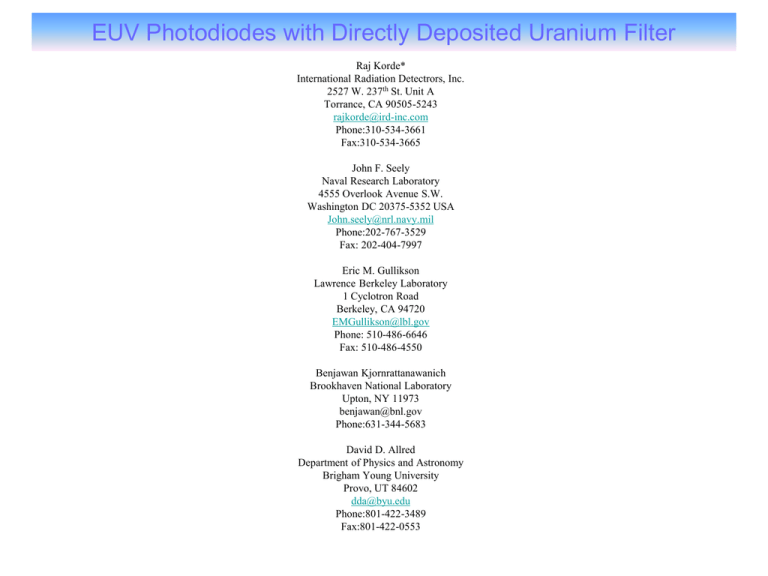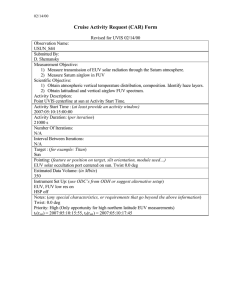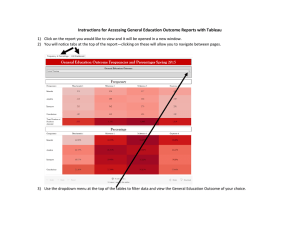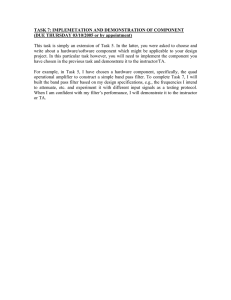EUV Photodiodes with Directly Deposited Uranium Filter
advertisement

EUV Photodiodes DepositedUranium UraniumFilter Filter EUV Photodiodes with with Directly Deposited Raj Korde* International Radiation Detectrors, Inc. 2527 W. 237th St. Unit A Torrance, CA 90505-5243 rajkorde@ird-inc.com Phone:310-534-3661 Fax:310-534-3665 John F. Seely Naval Research Laboratory 4555 Overlook Avenue S.W. Washington DC 20375-5352 USA John.seely@nrl.navy.mil Phone:202-767-3529 Fax: 202-404-7997 Eric M. Gullikson Lawrence Berkeley Laboratory 1 Cyclotron Road Berkeley, CA 94720 EMGullikson@lbl.gov Phone: 510-486-6646 Fax: 510-486-4550 Benjawan Kjornrattanawanich Brookhaven National Laboratory Upton, NY 11973 benjawan@bnl.gov Phone:631-344-5683 David D. Allred Department of Physics and Astronomy Brigham Young University Provo, UT 84602 dda@byu.edu Phone:801-422-3489 Fax:801-422-0553 ABSTRACT Silicon photodiodes with directly deposited Si/Zr and Mo/Si filters are used presently to make dose measurements in EUV steppers and sources. Owing to the inherent optical properties of Si, Zr, and Mo, passband of these coatings is quite wide (6 to 10 nm) and the peak transmission does not occur at the desired 13.5 nm wavelength. According to the CXRO, LBL optical constants, uranium will be an excellent filter material because of the narrow EUV passband and the peak transmission around 13.5 nm. Characteristics of the fabricated AXUV photodiodes with directly deposited U/Zr/Si filter will be presented here. Zirconium and silicon were added to the filter to get better visible light blocking and surface passivation respectively. The fabricated devices had a peak responsivity of .0124 C/J at 13.6 nm with 3 nm passband and 3 orders of magnitude blocking for the visible light. Keywords: Sensors and Diagnostics, EUV dose measurement Fig: Structure of the AXUV/SXUV photodiode with directly deposited filter AXUV QE Com parison Theoretical Ti/Zr/U/Si 10/130/200/200 nm 13 LBL Ti/Zr/U/Si 12 BNL Ti/Zr/U/Si 11 10 AXUV100 S/iZr 9 QE (Eph) 8 AXUV100 Mo/Si 7 6 5 4 3 2 1 0 -1 12 12.5 13 13.5 14 14.5 15 Wavelength (nm ) 15.5 16 16.5 17 LBL Ti/Zr/U/Si 1.25 1.00 QE (Eph) 0.75 0.50 0.25 0 12 14 16 Wavelenght (nm) 18 BNL Ti/Zr/U/Si 1.00 QE (Eph) 0.75 0.50 0.25 0 12 14 16 Wavelength(nm) 18 200nmSi/130nmZr 200nmUO3/10nmTi measured Fig: The Simulated transmittance with 200nm UO3 instead of 200nm U matches with the measured values!


